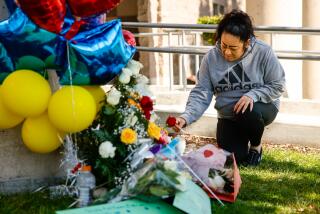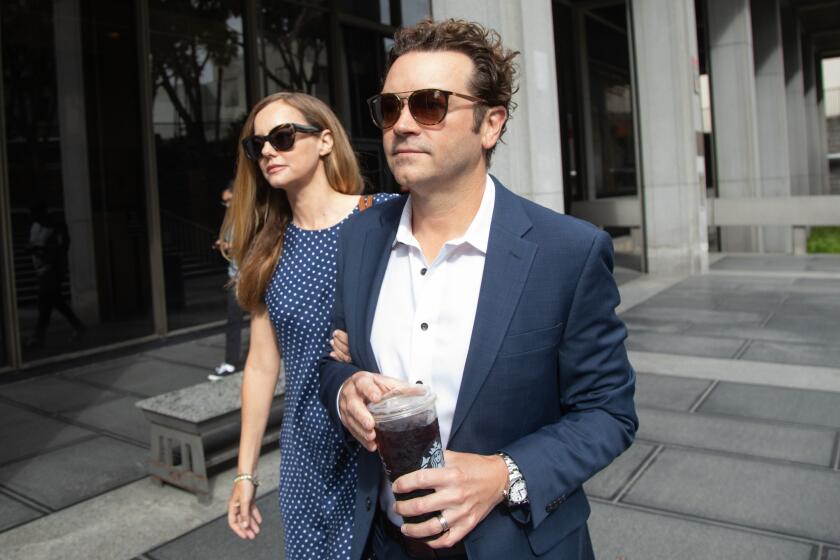Fear, Grief Cast a Pall Over Search for Killer
Activists canvassing a mid-city neighborhood seeking the killer of 13-year-old Joey Swift on Wednesday found themselves confronting all the factors that make gang crime so confounding in Los Angeles.
They met with wariness and fear from neighbors.
“They know who did it. Everybody knows,” said one bystander who declined to give a name.
And at one point, several men who identified themselves as gang members told the canvassers to stop. There was a brief confrontation in which a TV cameraman was jostled.
And finally, they met grief. Donnie Greene, a worker at Crenshaw High School, gently fingered a silver crucifix around his neck that he said was given to him by his fiance -- Donna Marie Collins, 35, a nursing student -- shortly before she was killed in a drive-by shooting last year.
Green said he has known 30 young murder victims over his years working with South Los Angeles high school students, and was acquainted with Marquise Pickens, a 14-year-old boy shot to death at almost exactly the same moment Joey was shot. Marquise was killed a few miles to the south at Crenshaw Boulevard and West Slauson Avenue.
Greene’s face was full of weariness and sadness as he watched the activists unfurl banners calling for an end to violence. “How to stop it? My, my, my,” he said. “I’m still trying to come up with something in my heart to stop it. I don’t know.... I just pray.”
Joey, an eighth-grader, was slain in a daylight drive-by shooting just north of the Santa Monica Freeway off Crenshaw Boulevard as he left church Sunday, a bystander to a gang fight. His killer has not been caught. Joey’s mother, Lorri Arbuckle, who lives nearby, ran up to the scene just in time to see her son die.
There have been several daylight shootings in South Los Angeles in recent weeks, some of which have passed with barely any public acknowledgment. But Joey’s has provoked a strong community response. Activists from half a dozen community groups gathered in front of the First Presbyterian Church Wednesday for what Najee Ali of Project Islamic Hope described as “a manhunt.”
“Gang members have declared war on the community, so we have declared war on them,” he said.
What’s so troubling about such shootings, Ali said, “is the lack of anger and response from the community. It is like it is just accepted. Look, this parking lot should be full of people.”
In all, about 40 people turned up for a march in search of Joey’s killer. Nearly all were church members, activists with the organizing groups, or members of Joey’s family. Very few neighbors or passersby took part.
The group began the march with speeches and prayers.
“Too many of our babies have died, and it’s as if nobody cares,” said Khalid Shah, an activist with Stop the Violence/Increase the Peace.
The Rev. Catherine Hughes, minister of the church Joey attended, offered an invocation.
“Lord,” she said, to cries of approval from the group, “We know there is a war overseas. But there is war going on right here in Los Angeles! ... We need courage.”
The group chanted “Stop the violence” and handed out fliers that read “Only a coward would kill an unarmed child.” They made appeals to neighbors to call the police at (213) 473-0444.
Some people offered encouragement. “I approve of this; we have do to something,” said nurse Valerie Phillips, leaning out her door as the group passed by. “Everyone is scared to talk, and that’s not right. This hurts. I hurt. It hurts! I saw him die. I saw his lips go ashen. I knew he wasn’t going to make it.... I want to see justice done. These are babies. Babies!”
Several neighbors said that the killers were well-known in the neighborhood, but that they doubted anyone would come forward.
People won’t come forward because they are afraid, said one bystander who didn’t give his name.
“They say there is witness protection, but how long do you have to wait for that? You can move, but people have family around here. And everyone can’t move. So if they don’t get you, they get your family.... I don’t want them to see me even talking to you. They assume you’re a snitch,” the man said.
Police have received tips but are still seeking witnesses willing to step forward, said Det. Tom Murrell.
Finding such witnesses is a constant difficulty in street shootings, he said. “People say to themselves, ‘This is kind of hopeless.’ ”
There is no single answer that would solve the problem, Murrell said. “There are a lot of vulnerable people in this community that gang members take advantage of. They are vulnerable, they feel like there is no hope, and there are no resources for this.”
There have been 116 killings in Los Angeles so far this year, down about 20% from this time last year, when homicides spiked, and about 11% below the same period two years ago.
As Joey’s marchers made their way north of the church, they handed a flier to Barbara Reddix, a gray-haired neighbor standing on the sidewalk.
After they left, Reddix stood looking after them.
“I know how that mother feels. I lost my son nine years ago, and they still haven’t solved the murder,” she said, speaking hesitantly. Her son’s name was Victor Reddix, and he was 32 when he died.
“I can’t even talk about it,” she said, and then laid a hand over her heart with a grimace. “Oh,” she said, “you feel it right here.”
More to Read
Sign up for Essential California
The most important California stories and recommendations in your inbox every morning.
You may occasionally receive promotional content from the Los Angeles Times.










